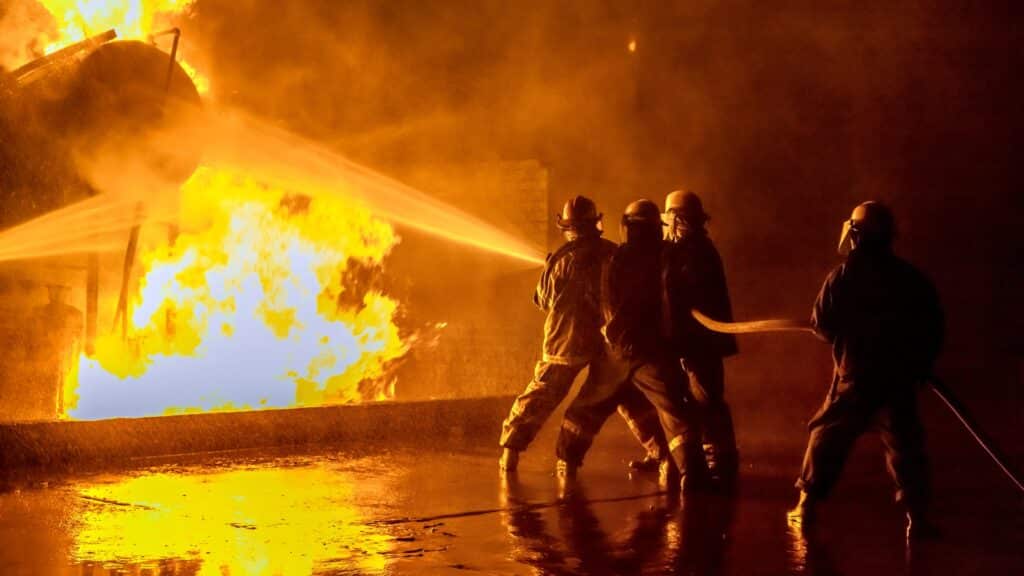
The difference between bravery and courage lies at the heart of their application. One is an impulsive response to danger, the other an intentional application of will in the face of fear.
Bravery is often a daring leap, impulsive and fiery in the face of danger. Courage, on the other hand, involves thoughtful action, grounded in self-awareness and conviction.
Stay with us as we uncover, through simple definitions and compelling distinctions, how these two attributes operate distinctly and how their understanding shapes our daily challenges and triumphs.
Bravery is a bold and often impulsive response to danger, characterized by a unique mental state in which fear is largely absent, and is tied to immediate decisive action.
Courage is a more deliberate and reflective journey involving self-awareness, living with integrity, and possessing the vitality to persist through challenges, extending beyond physical risks to encompass moral adversity.
The terms bravery and courage are distinct: bravery is typically a quick reaction to immediate threats, while courage involves mindfulness and the conscious choice to persevere in the face of fear, aligned with deeper personal values or societal ideals.

The concept of bravery is deeply rooted in our linguistic history. The term ‘bravery’ originates from the Middle French term ‘brave,’ meaning ‘splendid’ or ‘valiant,’ and is linked to the Italian word ‘bravo,’ suggesting ‘brave’ or ‘bold’. This linguistic heritage provides a glimpse into the essence of bravery: an audacious boldness in the face of danger or adversity.
Bravery, in its purest form, is marked by:
A unique mental state where fear is largely absent
Allowing for decisive and immediate action in the face of danger
Fearless determination
Mental fortitude necessary to confront challenges head-on, often in situations that would cause most to retreat.
Imagine the scene of a burning building. Amidst the chaos and fear, a firefighter rushes in, fearlessly navigating the blaze to rescue those trapped inside. Or consider a soldier, steadfast in the turmoil of battle, placing their life at risk for the safety of others. These acts of bravery demonstrate an unwavering resolve that transcends fear and embodies the essence of bravery.
True bravery is not a reckless dash into danger; it is a calculated act of boldness, fueled by an innate sense of duty or moral courage. True courage is the courageous leadership that steps up when others step back, the courageous acts that make headlines and inspire others.
In essence, bravery is:
the daring audacity that fuels heroic deeds
the spark that lights the path through the darkest of times
the voice that says, “I can,” even when the odds suggest otherwise
the courage that shatters the status quo and pushes the boundaries of what is possible.

While bravery often takes center stage in tales of heroism, courage quietly weaves its way into every facet of our lives. Unlike the bold, often impulsive nature of bravery, courage involves a deeper, more introspective journey. It is a journey marked by:
self-reflection
integrity
vitality
persistence
faith
The path requires courage, as it starts with confronting personal truths. It peels back the layers of our being, acknowledging our fears, faults, and vulnerabilities. This process of self-reflection is a stepping stone towards personal change, shaping us into courageous individuals capable of facing life’s challenges with unwavering resolve.
The courage journey also involves living with integrity, which requires taking responsibility for one’s thoughts, feelings, and actions, and altering behaviors to live authentically. It takes moral courage to stand by our principles and values, even when they challenge the status quo or confront risk.
Vitality, another component of psychological courage, involves seizing life with a positive spirit, readiness for both success and failure, and maintaining hope and determination. This zest for life fuels our courage, empowering us to persevere through adversity and persist in our efforts despite obstacles. With more courage, we can face challenges head-on and continue to grow, while also acknowledging the importance of physical courage in certain situations.
Courage is not just about facing physical danger; it is also about taking risks, stepping into the unknown, and embracing change. It requires faith - confidence or trust in oneself, one’s values, goals, and support systems, enabling one to take risks with greater courage. Having a clear purpose or goal enhances courage by giving individuals something to strive for in spite of difficulties.
As we delve deeper into the realms of bravery and courage, one thing becomes clear: although these two words are often used interchangeably, they represent distinct concepts. The key differences between bravery and courage lie in their nature and how they manifest in our actions and decisions.
Bravery is often an impulsive, reflexive response to immediate danger, while courage involves deliberate and mindful decision-making over a longer term. A brave act is typically a reaction to a sudden threat, like running into a burning building to save someone. In contrast, a courageous act involves making a conscious choice, often in the face of personal fears or adversity, like standing up against injustice or pursuing a challenging career path.
While bravery typically involves actions taken in response to physical threats or challenges, both bravery and courage encompass facing not only physical but also emotional and moral adversities. In the ongoing debate of bravery versus courage, bravery could be seen in the soldier on the battlefield, while courage is evident in the whistleblower standing against corporate corruption.
A courageous person often acts with mindfulness, fully aware of the repercussions of their actions, aligning with deep personal values or societal ideals. They demonstrate courageous leadership by making decisions that may not be popular but are morally right, showing that courage involves a deeper level of understanding and intentionality.
Perhaps the most significant distinction lies in their relationship with fear. Bravery may manifest as an absence of fear and an immediate ‘fight or flight’ reaction, whereas courage is characterized by the awareness of fear but the determined choice to persevere due to moral and emotional strength. In essence, bravery faces fear head-on, while courage acknowledges fear but decides to move forward anyway.

Bravery and courage are not just concepts for the battlefield or emergency situations; they permeate all aspects of our lives, including:
Personal growth
Relationship-building
Leadership
Facing adversity
Standing against injustice
Personal growth often requires acts of courage, such as learning something new, stepping into the unknown, or confronting personal fears. These acts may not make headlines like the brave deeds of soldiers and firefighters, but they are just as significant in shaping our personal life. In fact, pursuing dreams requires bravery, as it often involves facing our deepest fears and pushing beyond our comfort zones.
In relationship-building, it takes bravery to admit when one is wrong and say sorry, enhancing interpersonal connections. Courageous leadership is demonstrated when one is willing to face discomfort and uncertainty, inspiring others by taking decisive action.
Facing daily adversity involves courageous actions, such as:
maintaining a positive outlook despite life’s challenges
embracing life’s small joys
standing against injustice
showing strength through our voice when we say no to wrongdoing
Expressions of gratitude, though seemingly simple, require vulnerability and sincerity, making them courageous acts that acknowledge the good in our lives and those around us. Whether it’s standing up for what’s right, pursuing a dream, or expressing appreciation, these acts of bravery and courage shape our lives and the world around us.
Cultivating bravery and courage is an essential part of personal growth. It involves:
Identifying and overcoming beliefs that prevent genuine living
Embracing mistakes
Clarifying personal values
Practicing mindfulness
Overcoming limiting beliefs can lead to stronger personal relationships and the ability to engage in courageous conversations. These interactions, marked by authenticity, vulnerability, mutual understanding, and respect, foster a deeper connection with others and with ourselves.
Embracing mistakes and clarifying personal values bolster confidence and inspire individuals to act in alignment with their beliefs. This alignment, coupled with mindfulness practices like taking time to pause before acting and engaging in mental fitness exercises, can enable individuals to make a conscious decision, acting with intention and control, enhancing their courage and fostering virtuous emotions.
Cultivating bravery and courage is not just about personal growth. It extends to our professional lives as well. Building emotional courage in the workplace involves:
Exercising the ability to handle challenges without compromising integrity
Promoting an environment of accountability
Enhancing leadership effectiveness
Whether it’s a personal or professional setting, cultivating bravery and courage can lead to profound growth and meaningful change.
In essence, bravery and courage, while interrelated, stand as distinct concepts. Bravery, rooted in boldness and fearlessness, allows us to confront immediate danger with unwavering resolve. Courage, on the other hand, involves a deeper journey of self-reflection, integrity, and faith, empowering us to face not just physical threats, but emotional and moral challenges as well.
As we navigate through life, let us strive to cultivate both bravery and courage, for they are the compass that guides us through adversity, the beacon that lights our path to personal growth, and the bedrock upon which we build our lives.
Yes, there is a difference between courage and bravery. Courage involves a conscious decision to act despite fear, driven by moral or virtuous values, while bravery is an immediate response to a situation, usually characterized by an absence of fear.
Courage involves mindful consideration of risks and making conscious decisions despite fear, while bravery is more spontaneous and involves setting aside fear. Both traits have their appropriate moments in both personal and professional life.
The true meaning of bravery is the ability to face danger, fear, or difficulty with courage and mental strength. It's about confronting frightening things without flinching, whether it's battling a dragon or entering a new environment.
Bravery and courage can be applied in personal growth, relationship-building, and leadership, and help in confronting fears, admitting mistakes, taking decisive actions, and standing against injustice. Embracing these qualities can bring about positive change in various aspects of daily life.
By overcoming limiting beliefs, embracing mistakes, clarifying personal values, and practicing mindfulness, you can cultivate bravery and courage for personal growth, leading to stronger relationships, effective leadership, and authentic living.